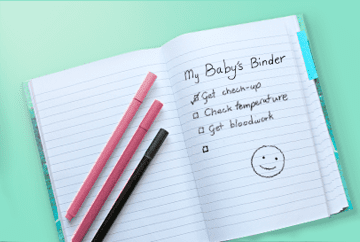Create Your Own Cerebral Palsy Medical Binder

Make the Most of Your Child’s Medical Visits
Children with cerebral palsy require appointments with several specialists. Their medical team consists of pediatricians, neurologists, orthopedists, physical therapists, occupational therapists and speech therapists. It is imperative to keep records of the recommendations given by each provider in order to assure that your child gets the best care.
Getting Organized
Managing the care of your child can be overwhelming but you can start getting organized today. Creating a medical binder is the first step to organizing your child’s medical care.
You will need these items to create your child’s medical binder:
- Binder
- Tabs
- Folders
- Loose leaf paper
- Business card plastic slip (Optional)
How to Organize Your Medical Binder
Starting a medical binder will allow you to jot down any changes in symptoms or record any improvements noted. You can also notate any questions that you want to remember to ask at your child’s next appointment.
Here are 7 sections you’ll need in your binder:
- Medication List - keeping track of medication names, dosing, frequency and dates medication was taken, will ensure that your child’s doctor safely prescribes the correct medication. Make sure you include past and current medications.
- Calendar - helps with keeping track of appointments and important dates. Keeping track of this is beneficial to remind you of upcoming appointments. It is also a great way to monitor your child’s frequency of visits.
- Contact - having quick access to information about your child’s medical provider will come in handy if other physicians ask you for their contact information.This will help them with discussing and coordinating your child's care.
- Treatments - keeping track of treatments such as physical therapy, occupational therapy, and speech therapy exercises will help you keep a timeline of your child's progress. In this section, you can also add notes about the exercises that your child's therapist wants you to help with at home.
- Testing - jotting down information about your child's tests, such as bloodwork and radiology helps you to keep track of their results.
- Notes - writing down any questions that you think of between appointments will ensure that you'll have a more productive visit the next time you are with your child’s medical provider.
- Diary - notating important dates, milestones, improvements or any changes in your child's symptoms will help you notice subtle changes that need to be shared with your child's physician before they worsen.
3 Benefits of Having a Medical Binder for Your Child
- You will be a more active member of your child’s medical team because they will trust that you are giving them accurate information.
- Your child’s treatment plan will be more consistent and safe
- You will feel more confident that you are managing your child’s care in a more efficient way.
